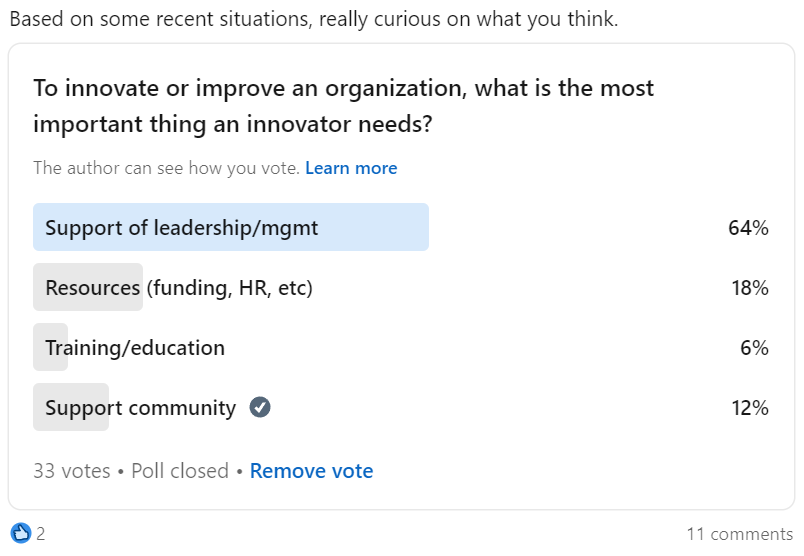Written by: Bob Bertsch
Leadership is a subject of fascination both in popular business and self-improvement books and in academic research. I have not been immune to this fascination, but in recent years I’ve come across an increasing number of blog and social media posts that frame leadership in ways that don’t resonate with me.
One recent example was a poll on LinkedIn that asked, “To innovate or improve an organization, what is the most important thing an innovator needs?” The answers to choose from were “Support of leadership/mgmt” (64%), “Resources (funding, HR, etc)” (18%), “Training/education” (6%), and “Support community” (12%).
 Sixty-four percent (64%) of the 33 respondents chose “Support of leadership/mgmt.” The number of votes for that option didn’t surprise me. After all, if an organization’s management does not support an innovation or other change effort, it likely will not succeed. What did surprise me was the almost complete absence of workers in the question or the choices. The “innovator” in this question might be a worker, but they might also be at some level of management. Maybe the “Support community” is made up of the innovator’s co-workers, but it could also consist of people at other organizations. In my experience, the most important thing an innovator needs is a team. Most change efforts don’t go very far without people to do the work. However, much of the popular writing on leadership is firmly focused on the “leader,” usually a manager or administrator, and barely mentions the function of the worker.
Sixty-four percent (64%) of the 33 respondents chose “Support of leadership/mgmt.” The number of votes for that option didn’t surprise me. After all, if an organization’s management does not support an innovation or other change effort, it likely will not succeed. What did surprise me was the almost complete absence of workers in the question or the choices. The “innovator” in this question might be a worker, but they might also be at some level of management. Maybe the “Support community” is made up of the innovator’s co-workers, but it could also consist of people at other organizations. In my experience, the most important thing an innovator needs is a team. Most change efforts don’t go very far without people to do the work. However, much of the popular writing on leadership is firmly focused on the “leader,” usually a manager or administrator, and barely mentions the function of the worker.
I was curious about that. Surely, if there is a leader in an organization, there must be followers. I wondered what academic research had to say about the role of followers in leadership. I found a relatively recent article (February 2023) that reviewed the existing research examining the relationship of “follower-related factors with leadership outcomes,” (Oc et al.). Perfect, I thought, the workers aren’t absent from the research, and this article would give me an overview of that research!
My excitement didn’t last long as the very first sentence threw me for a loop, “Leadership can be defined as “a goal-influence process that occurs between a leader and a follower, groups of followers, or institutions” to achieve a common, shared objective (Antonakis & Day, 2018, p. 5).” Wait…what? Leadership can be defined as a process? All the books I’ve read on leadership were centered on the leader. Their definition of leadership seemed to be “leadership is the actions leaders take.” If the actions leaders take can be associated with negative organizational outcomes those actions are categorized under “bad leadership.” If the leader’s actions can be associated with positive organizational outcomes, they are categorized under “good leadership.” But, if leadership can be defined as a process, surely the academic research will reflect that, I thought. I readied myself to learn about how workers, middle management, organizational structure, clients, and other dynamic factors influenced leadership.
My hopes were dashed by the second sentence of Oc’s review, “Nonetheless, the vast majority of leadership research focuses on only half of this equation, treating leaders as the sole driver of their organization’s success or failure and relegating followers to the role of passive recipients of leaders’ influence” (2023).
In the research that did include follower-related factors, Oc and their colleagues found that more than 70% of them focused on differences in individual followers (demographics, personality traits, etc.), how followers perceive themselves and leaders, and what motivates followers’ performance behavior. Less than 30% of the articles included in the review addressed factors like follower’s emotional state and well-being, the power and influence followers have, how followers relate and interact with each other, job and task characteristics of followers, or other important factors in leadership. It seems the workers are largely missing from the research as well.
Leadership books and research that frame leadership as a combination of skills and traits that are mostly the domain of the “leader” themselves can give us a false sense of control. They can also cause us to look at leadership development as an individual process for “leaders, rather than focusing development on all aspects of the leadership process, including but not limited to leaders, followers, or any member of a team or organization.
As Oc et al. write, “Followers play an essential role in leadership processes. If there were no followers, there could be no leadership. Leadership is also a dynamic process, and who is leading and who is (or are) following can change rapidly, just as who is influencing and who is being influenced often changes dynamically” (2023).
So, you may be thinking, I’m not a leadership researcher and I don’t plan on writing a book on leadership any time soon. What am I supposed to do about all this? I’m thinking the same thing, but here’s what I think I can do.
- Talk about it! I’m going to talk about this in my organization, including with my leaders. I’m going to add comments like, “Do you think leadership is a process?” and “What role do we play in co-producing leadership when we are not the one taking the lead?” to social media posts about leadership.
- Think about it! I’m going to think about the dynamic nature of leadership while it’s happening. I’ll try to notice when I’m leading and when I’m not leading, and how my actions are contributing to the leadership process.
- Learn about it! Oc and their co-authors found a small percentage of leadership research that addressed more complex follower factors, but they did find some. That means there are studies I can learn from. There might also be popular books and online discussions that define leadership as a process and include followers in that process. I’ll continue to look for them and learn from them when I can.
It’s a start. I hope you’ll join me.
References
Antonakis, J., & Day, D. V. (2018). Leadership: Past, present, and future. In The nature of leadership, 3rd ed (pp. 3–26). Sage Publications, Inc. https://doi.org/10.4135/9781506395029.n1.
Oc, B., Chintakananda, K., Bashshur, M. R., & Day, D. V. (2023). The study of followers in leadership research: A systematic and critical review. The Leadership Quarterly, 34(1), 101674. https://doi.org/10.1016/j.leaqua.2022.101674













